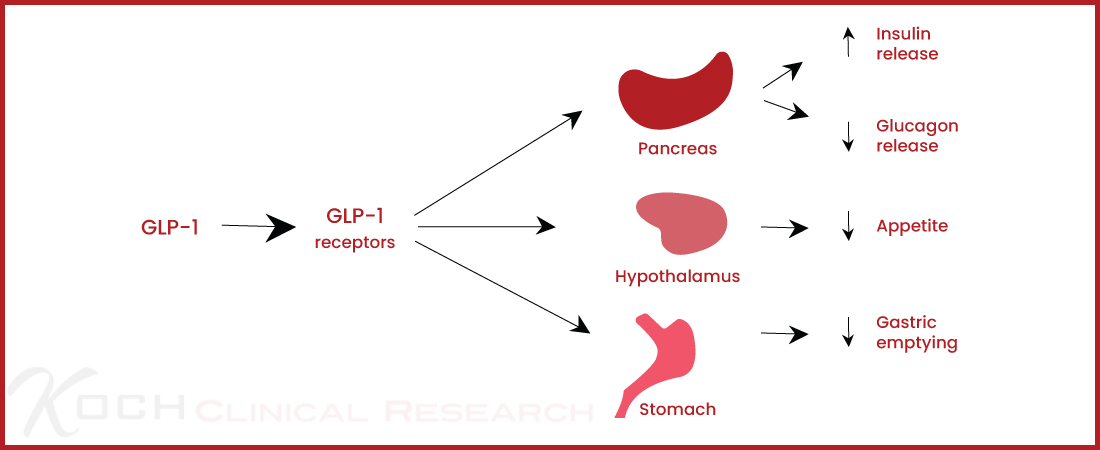
GLP-1 medications—short for glucagon-like peptide-1 receptor agonists—are a class of drugs originally designed to manage type 2 diabetes. However, they’ve also shown promising results in promoting weight loss by regulating appetite, slowing stomach emptying, and improving blood sugar control. These effects make GLP-1 weight loss therapies a potential option for individuals struggling with obesity or weight-related conditions.
But who is a good candidate for GLP-1 treatments? That’s where clinical trials come in. These studies play a crucial role in identifying who is a candidate for GLP-1, ensuring that the therapy is safe, effective, and tailored to those who will benefit most. Participating in a clinical trial not only provides access to new treatments but also helps advance medical understanding for future care.

What Are GLP-1 Medications?
GLP-1 medications are a type of treatment known as glucagon-like peptide-1 receptor agonists. These drugs work by mimicking a natural hormone in the body that helps control blood sugar levels, reduce appetite, and slow down digestion. As a result, people often feel full sooner and eat less—making GLP-1 weight loss a promising approach for individuals struggling with obesity or weight-related health issues.
Some of the most commonly prescribed GLP-1 drugs include semaglutide and liraglutide. These medications have gained attention for their dual benefits: improving blood sugar control and supporting sustainable weight loss.
When considering who is a good candidate for GLP-1, doctors often look at factors like body mass index (BMI), weight-related medical conditions, and previous treatment history. Understanding who is a candidate for GLP-1 helps ensure the right individuals receive the most benefit while minimizing risk.

Purpose of a GLP-1 Weight Loss Trial
The primary goal of a GLP-1 weight loss clinical trial is to evaluate how effective and safe these medications are in helping individuals lose weight. Researchers assess multiple aspects, such as how much weight participants lose, how well the medication is tolerated, and what the ideal dosage might be for different individuals.
These trials are crucial in determining whether GLP-1 drugs can provide long-term weight management benefits beyond their original use for type 2 diabetes. They also help identify any side effects and monitor overall health impacts over time.
Identifying who is a good candidate for GLP-1 is essential in these studies. By selecting participants who meet specific health and weight criteria, researchers can better determine who is a candidate for GLP-1 therapies and how these treatments might be used more broadly in the future.
Who Can Be a Good Candidate?
Identifying who is a good candidate for GLP-1 medications is fundamental when considering participation in a GLP-1 weight loss clinical trial. While each study may have its own unique requirements, most follow some general eligibility guidelines.
A. General Eligibility Criteria:
To qualify for many GLP-1 weight loss trials, participants are often adults between the ages of 18 and 65 (or as specified by the trial). A common requirement is having a body mass index (BMI) of 30 or higher. These criteria help researchers focus on individuals who may benefit most from GLP-1 medications.
It’s also important to note the distinction between lipedema and obesity, as individuals with lipedema may meet BMI thresholds but require different treatment approaches.
B. Common Health Conditions Considered:
People living with conditions like type 2 diabetes, or high blood pressure may often qualify for these trials. These comorbidities are not only common among individuals struggling with weight but are also areas where GLP-1 therapies have shown promising effects.
C. Lifestyle and Medical History Factors:
Participants must also meet certain lifestyle and medical history standards. For example, they should be willing to follow the study protocol, attend check-ups, and record health updates. Additionally, individuals with a recent history of serious conditions such as pancreatitis, thyroid cancer, or other exclusions specific to the study may not qualify.
Ultimately, who is a good candidate for GLP-1 will depend on the specific inclusion and exclusion criteria of each trial—but in general, those struggling with weight-related health conditions and willing to engage in medical research are strong candidates.
Who May Not Qualify?
While many people may meet the criteria for a GLP-1 weight loss clinical trial, some individuals may not be eligible due to safety concerns or study-specific exclusions. Understanding who may not qualify is just as important as knowing who is a good candidate for GLP-1 treatment.
Medical Conditions:
Individuals with certain health conditions may be excluded from participating in a trial. These often include a history of pancreatitis, medullary thyroid carcinoma, or multiple endocrine neoplasia syndrome type 2 (MEN 2). These conditions may increase risk when using GLP-1 medications.
Pregnancy and Breastfeeding:
Most GLP-1 weight loss studies do not allow participation from pregnant or breastfeeding women due to unknown risks to the baby and potential hormonal effects. Women of childbearing age may need to use effective contraception during the trial.
Conflicting Treatments or Trials:
Those currently taking other weight-loss medications or actively participating in another clinical trial are typically excluded. This helps ensure the accuracy of the data and minimizes the risk of treatment interactions.
Also Read: How Clinical Trials Help Shape the Future of Obesity and Diabetes Treatment
Benefits of Participating in a GLP-1 Clinical Trial
Participating in a GLP-1 weight loss clinical trial can offer several meaningful benefits—both personally and for the broader healthcare community. While eligibility is determined by specific guidelines, those who are a good candidate for GLP-1 may gain valuable advantages from their involvement.
By taking part in a weight loss clinical trial, eligible individuals may access treatments designed to address obesity-related conditions under close medical supervision.
Access to Potential New Treatment Options:
Clinical trials provide participants access to investigational treatments before they become widely available. For individuals who are candidates for GLP-1 therapies, joining a study may offer new hope when other weight loss methods have not yielded the desired results.
Regular Health Monitoring and Support:
Throughout the study, participants receive regular health check-ups, lab tests, and close monitoring from a professional medical team. This ongoing care ensures any changes in health are tracked, offering added support during the process.
Contribution to Medical Research:
By enrolling in a GLP-1 weight loss trial, participants play a direct role in advancing medical science. The data collected helps researchers evaluate the safety and effectiveness of GLP-1 medications, potentially benefiting thousands of future patients struggling with obesity.
What to Expect During the Trial
If you’re considering joining a GLP-1 weight loss clinical trial, understanding what’s involved can help you feel more prepared and confident. Whether you’re still exploring if you’re a good candidate for GLP-1 or have already determined your eligibility based on your health, understanding the trial process is important.
Initial Screening and Medical Evaluation:
The first step typically includes a screening visit where your medical history, current health status, and eligibility are reviewed. This helps the research team determine if you’re a good fit for the study.
Study Duration and Requirements:
Trial timelines vary but may range from several weeks to months. During this time, participants may need to attend clinic visits, follow a treatment schedule, and keep a health journal. Full commitment to the protocol is essential for reliable results.
Possible Side Effects and Risks:
Before the trial begins, all potential risks and side effects will be discussed in detail. This includes how the GLP-1 weight loss medication may affect your body and what to do if you experience adverse reactions. Participant safety is always the top priority.
Conclusion
GLP-1 weight loss clinical trials offer a unique opportunity to explore promising treatments for obesity. By understanding who is a good candidate for GLP-1, eligible individuals can access new therapies, contribute to research, and receive expert care—helping shape the future of safe, effective weight loss solutions for many.






